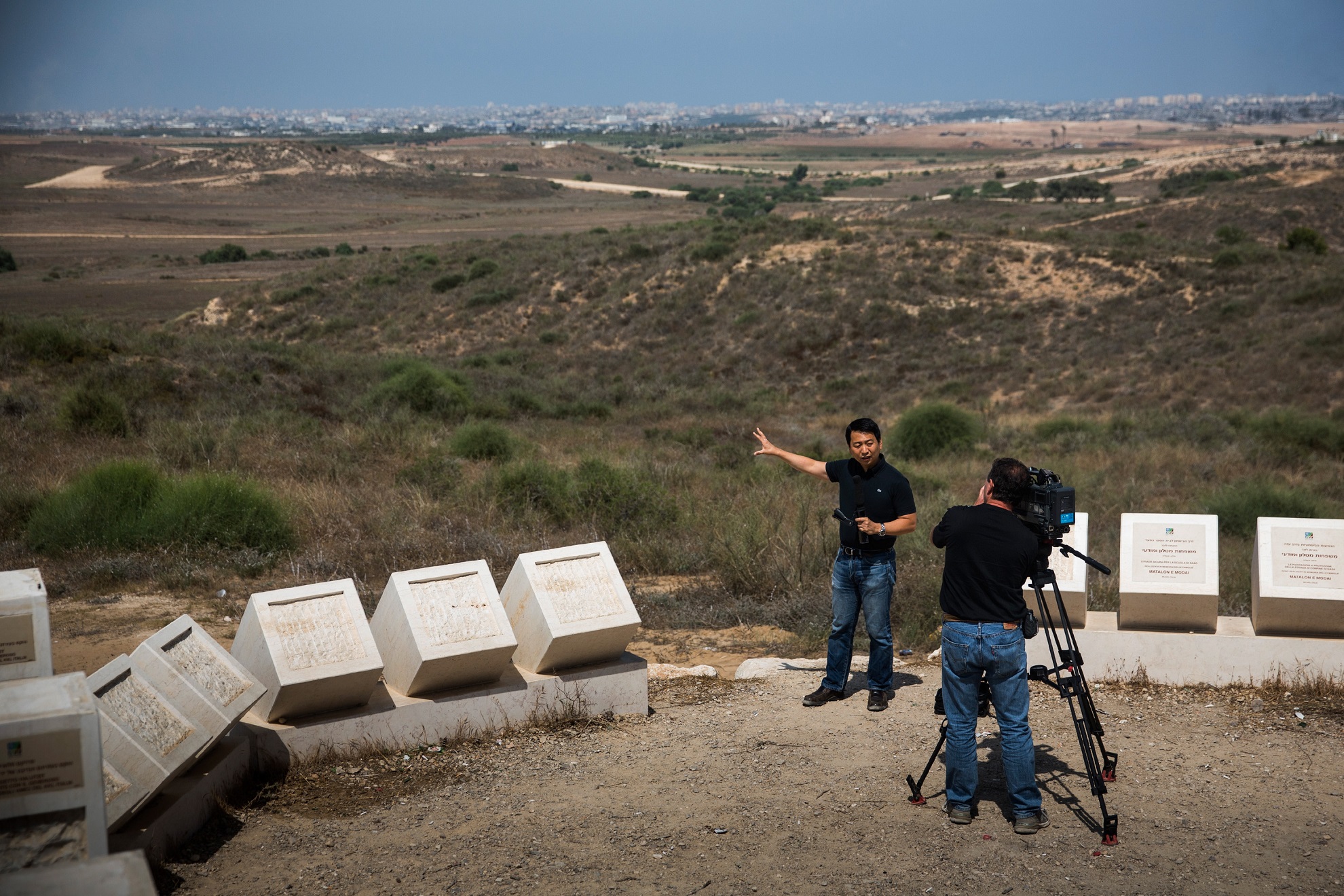لم يدع الاحتلال الإسرائيلي أسلوباً إلا واستخدمته في حربه ضد الفلسطينيين، ولم يكن ميدان الإعلام بعيداً عن هذه الحرب، حيث وظف كافة وسائله الإعلامية في شيطنة الفلسطينيين ووسمهم بالإرهاب وممارسة دعاية واسعة ضدهم من خلال إعلامها الناطق باللغات الأجنبية. ولم يقتصر الأمر على ذلك بل تجاوزه إلى أن استخدم محتوى الإعلام الفلسطيني كوسيلة للهجوم على الفلسطينيين، عبر نقل هذا المحتوى بالشكل الذي يريده.
النقل عن الإعلام العبري
باتت الصحافة العبرية أهم المصادر الصحفية لوسائل الإعلام الفلسطينية في ما يخص الصراع مع الاحتلال. ولعل أوضح الأمثلة على أنماط النقل عن الإعلام العبري، الذي يخدم الدعاية الإسرائيلية، هي التكهنات باندلاع حروب، وخطوات (تخفيف أو تشديد) الحصار المفروض على غزة، وكذلك مستجدات التهدئة وغيرها من القضايا التي تمس الحياة اليومية للمواطن الفلسطيني.
ويشكل الخبر منذ نشره على المواقع العبرية مادة دسمة تستوجب نشرها في جميع وسائل الإعلام الفلسطينية، وتبنى عليها تحليلات وتوقعات وحتى تعليقات من سياسيين وصناع قرار، دون الأخذ بعين الاعتبار أن هذه الأخبار والمعلومات صادرة عن إعلام العدو، دون أية معايير أو رقابة؛ الأمر الذي يساهم في إيصال الدعاية الإسرائيلية إلى كل بيت ومواطن بواسطة وسائل إعلام فلسطينية.
يظهر هذا النقل جليّاً من خلال احتواء معظم المواقع الفلسطينية الإخبارية، لزاوية للترجمات والأخبار الواردة في إعلام العدو، حيث تأتي هذه الأخبار في إطار المصادر الرسمية، ويتم التعاطي مع هذه الأخبار بمصداقية عالية، وتنتشر على نطاق واسع دون وجود رقابة على المحتوى المنشور.
ارتباط بالمؤسسة العسكرية والأمنية
تعليقاً على هذا الموضوع، يقول الدكتور المتخصص في الشأن الإسرائيلي حاتم أبو زايدة إن إعلام العدو مرتبط بالمؤسسة الأمنية والعسكرية في الكيان، ويوجد عدد من الإعلاميين الكبار كانوا يشغلون مناصب في أجهزة الأمن والمخابرات العسكرية "أمان"، بالإضافة إلى ارتباط معظم المؤسسات الإعلامية بالمكتب العسكري لرئاسة الأركان، عدا عن هيئة الرقابة العسكرية التي تراجع كافة المحتويات الأمنية والعسكرية المراد نشرها.
ويضيف أن "إعلام العدو بات جزءاً من المؤسسة الرسمية، مع هامش حركة وحرية في ما يتعلق بالداخل الإسرائيلي، حيث أن هذا الإعلام له الحرية في تناول شؤون البلاد والحكم بشكل حر، ولكن عندما يتعلق الأمر بالقضية الفلسطينية والقضايا الأمنية، تصبح وسائل الإعلام أداة في يد القيادة السياسية والعسكرية"، على حد تعبيره.
حرب نفسية
ويلفت أبو زايدة الانتباه إلى أن الهيئات المعنية كجهاز المخابرات الداخلية "الشاباك" وجهاز "أمان" والمكاتب العسكرية تقوم بتسريب معلومات وشائعات تجاه الشعب الفلسطيني ضمن خطط ممنهجة للحرب النفسية، مشيراً إلى أنه لا يصدر أي شيء يتعلق بهذه القضايا إلا من خلال السماح بنشره عبر الهيئات الأمنية الرقابية.
ويقول "من العبث اعتبار المؤسسة الإعلامية منفصلة عن السياق العام الإسرائيلي الرسمي، وهو الذي يسير بخطوات واضحة في سياق حرب ضد الشعب الفلسطيني"، مؤكداً أن العمل الإعلامي الموجه ضد الشعب الفلسطيني يكون منسقاً ومدروساً بشكل دقيق، ويعد محتواه بواسطة خبراء في الرأي العام و علم النفس.
وبحسب أبو زايدة فإنه و"خلال فترات متباعدة، تخرج تصريحات بأن جيش الاحتلال أعطى الضوء الأخضر لشن حرب وأن هناك مناورات تحاكي حرب شاملة في غزة، مع ذكر تفاصيل وسيناريوهات متعددة، يتم تطعميها بتصريحات رسمية من كبار الجنرالات في الجيش؛ لتكسب زخماً ومصداقية ويزداد تداولها وتأثيرها على الرأي العام، وهو ما يقابله ترجمة ونشر من الإعلام الفلسطيني لهذه المعلومات حيث تنعكس هذه الداعية على نفسية المواطنين وعلى المقاومة في غزة".
ويشدد على أن السياسة الإعلامية الإسرائيلية تعتمد على إبراز بعض الأخبار وإخفاء البعض الآخر، مدللاً على ذلك بالتعامل الإعلامي الإسرائيلي مع عملية التسلل الفاشلة التي نفذها جيش الاحتلال في خانيونس، جنوب قطاع غزة، قبل عدة أشهر، حيث فرض جيش الاحتلال تعميماً إعلامياً على الحادثة وحظر تداول ما تصرح به المقاومة والاكتفاء بالرواية الرسمية، وعدم إعطاء الخبر صدى كبيراً، وذلك بناء على توجيهات الناطق بلسان جيش الاحتلال.
من جهة أخرى، يعمد الاحتلال إلى تضخيم تأثير ونتائج عمليات الاستهداف التي ينفذها ضد قيادات المقاومة وهدم الأنفاق، كذلك حديثه عن تطور قدراته العسكرية.
ويلفت أبو زايدة إلى أن أخبار التطبيع تأتي ضمن خانة الأخبار المضخمة، حيث تحرص الهيئات الرقابية على نشرها بشكل واسع، وهو ما سيسرع في عجلة التطبيع العربي الإسرائيلي.
دور الإعلام في الحروب
خلال الحروب، يعمل الإعلام الإسرائيلي تحت تأثير الجهاز الأمني والعسكري في تل أبيب. وبحسب أبو زايدة، عمد إعلام العدو قبيل شن حرب العام 2008 على غزة على طمأنة سكان غزة وفصائل المقاومة وإيهام الغزيين بأن الأمور ستتحسن، حيث نشر تقارير تؤكد أنه سيتم فتح المعابر وأن وفداً إسرائيلياً سيتوجه لمصر بهدف التوصل لاتفاق تهدئة. إلا أن الاحتلال باغت بعد ذلك غزة بشن الحرب، حيث ارتكب مجزرة كبرى في المقار الأمنية الفلسطينية، وهذا المشهد تكرر أيضاً في حرب 2012.
وخلال حرب العام 2008، تحدث الإعلام الإسرائيلي عن استمرار الحرب لأشهر وكان يبرز مظاهر تحشيد قوات الاحتياط وسرب خطة احتلال القطاع، في الوقت الذي كان وزير الحرب الإسرائيلي إيهود باراك يسعى لوقف الحرب في أسرع وقت. وهو ما تكرر في حرب 2014، حيث سرب الإعلام عن وجود بنك أهداف جديد للاحتلال وتوسع العملية البرية حيث كان نتنياهو يبحث عن وقف إطلاق نار بعد أسبوع واحد من بداية الحرب.
وبحسب أبو زايدة، فإنه وخلال الحروب، يكتظ الإعلام الإسرائيلي بالأخبار والتهديدات المبطنة كالاجتياحات الكاملة وسياسة الأرض المحروقة في مناطق محددة بهدف دفع السكان لإخلائها، الأمر الذي يترك أثراً على مجريات الحروب بفضل نقل الإعلام الفلسطيني كل ما يتم نشره.
قلة وعي الإعلام الفلسطيني
"الإعلام الفلسطيني يتعامل بشكل خاطئ مع كل ما يقدمه الإعلام الإسرائيلي، دون أية مراعاة لما قد تتسبب به هذه الترجمات من ضرر في المجتمع وتأثير سلبي على الجبهة الداخلية الفلسطينية"، برأي أبو زايدة الذي يشير إلى أن الاعلام الإسرائيلي يعتمد بشكل أساسي على طبيعة الإعلام الفلسطيني، حيث يضع العناوين التي تجذبه والمحتوى الذي من السهل نشره وتفشيه في الشارع ويمرر من خلاله ما يريد.
محاولة منع الاختراق الإعلامي الإسرائيلي
من جهته، يرى مسؤول المكتب الإعلامي الحكومي سلامة معروف أن الإعلام الإسرائيلي هو إحدى أدوات الاحتلال ضد الشعب الفلسطيني، وإن المكتب الحكومي، حذر مراراً من النقل عن الإعلام الإسرائيلي.
ويضيف: "نعمل على رفع جانب التوعية في الوسط الإعلامي من خلال عقد ورش عمل يشارك فيها مختصون في الشأن الإسرائيلي ومحرري الترجمة عن الصحافة العبرية للحديث عن خطر إعلام الاحتلال وأثره على الجبهة الداخلية الفلسطينية وقد حققنا تقدماً ملموساً ولكن للأسف في ظل وجود مواقع التواصل الاجتماعي، أصبح النقل عن الصحافة العبرية متاحا للجميع عبر برامج الترجمة حيث تجاوز الأمر المؤسسات الإعلامية وأصبح في يد النشطاء والمدونين وهو ما أتاح وصول الدعاية الإسرائيلية دون السيطرة على مصادرها".
وبحسب معروف، ليس هنالك قانون مباشر إلا قانون المطبوعات والنشر ولا يوجد نص يمكن أن يستند عليه بخصوص التعاطي مع الإعلام الإسرائيلي لذلك يقتصر الأمر على التوعية والإرشاد والتعميمات.


















![Palestinian journalists attempt to connect to the internet using their phones in Rafah on the southern Gaza Strip. [Said Khatib/AFP]](/sites/default/files/ajr/2025/34962UB-highres-1705225575%20Large.jpeg)





















